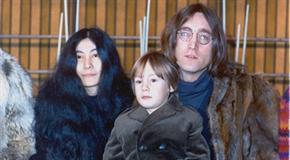Features
Real ‘Lucy in the Sky with Diamonds’ Gravely Ill
Not so unusual, really.
Except she is Lucy Vodden – the girl who was the inspiration for the Beatles’ 1967 psychedelic classic “Lucy in the Sky With Diamonds” – and he is Julian Lennon, the musician son of John Lennon.
They are linked together by something that happened more than 40 years ago when Julian brought home a drawing from school and told his father, “That’s Lucy in the sky with diamonds.”
Just the sort of cute phrase lots of 3- or 4-year-olds produce – but not many have a father like John Lennon, who used it as a springboard for a legendary song that became a centerpiece on the landmark album Sgt. Pepper’s Lonely Hearts Club Band.
“Julian got in touch with me out of the blue, when he heard how ill I was, and he said he wanted to do something for me,” said the 46-year-old Vodden, who has lupus, a chronic disease where the immune system attacks the body’s own tissue.

Lennon, who lives in France, sent his old friend flowers and vouchers she could use to buy plants at a local gardening center, since working in her garden is one of the few activities she is still occasionally well enough to enjoy. More importantly, he has offered her friendship and a connection to more carefree days. They communicate mostly by text message.
“I wasn’t sure at first how to approach her. I wanted at least to get a note to her,” Julian Lennon told The Associated Press. “Then I heard she had a great love of gardening, and I thought I’d help with something she’s passionate about, and I love gardening too. I wanted to do something to put a smile on her face.”
Vodden admits she enjoys her association with the song, but doesn’t particularly care for it. Perhaps that’s not surprising. It was thought by many at the time, including BBC executives who banned the song, that the classic was a paean to LSD because of the initials in the title. Plus, she and Julian were 4 years old in 1967, the “Summer of Love” when Sgt. Pepper was released to worldwide acclaim. She missed the psychedelic era to which the song is indelibly linked.
“I don’t relate to the song, to that type of song,” said Vodden, described as “the girl with kaleidoscope eyes” in the lyrics. “As a teenager, I made the mistake of telling a couple of friends at school that I was the Lucy in the song and they said, ‘No, it’s not you, my parents said it’s about drugs.’ And I didn’t know what LSD was at the time, so I just kept it quiet, to myself.”
There’s no doubt the fanciful lyrics and swirling musical effects draw heavily on the LSD experiences that were shaping Lennon’s artistic output at the time – although many of the musical flourishes were provided by producer George Martin, who was not a drug user.
“The imagery in the song is partly a reflection of John’s drug experiences, and partly his love of Alice in Wonderland, said Steve Turner, author of A Hard Day’s Write, a book that details the origins of every Beatles song. “At the time it came out, it seemed overtly psychedelic, it sounded like some kind of trip. It was completely new at the time. To me it is very evocative of the period.”
Turner said his research, including interviews with Vodden and Julian Lennon, confirm that she is the Lucy in the song. He said it was common for John Lennon to “snatch songs out of thin air” based on a simple phrase he heard on TV or an item he read in the newspapers. In this case, Turner said, it was the phrase from Julian that triggered John’s imagination.
Veteran music critic Fred Schruers said Julian Lennon’s reaching out to help Vodden as she fights the disease is particularly moving because of the childlike nature of the song.
“It’s enormously evocative but with a tinge of poignancy,” he said. “It’s the lost childhood Julian had with that little Lucy and the lost innocence we had with the psychedelic era, an innocence we really cherished until it was snatched away.”
Vodden was diagnosed with lupus about five years ago after suffering other serious health problems. She has been struggling extreme fatigue, joint pain, and other ailments.
“She’s not given up, she’s a fighter, and she has her family backing her, that’s a good thing,” said Angie Davidson, campaign director for St. Thomas’ Lupus Trust, which funds research. “We need more people like her, more Lucys.”
Davidson, who also has the disease, said it affects each person differently, typically causing exhaustion and depression. When the disease kills, she said, it does so by attacking the body’s internal organs.
It has become difficult for Vodden to go out – most of her trips are to the hospital – but recently she and her husband went to a bookstore and heard the song playing over the store’s music system. When they went to another shop, the song was on there as well.
“That made me giggle,” she said.